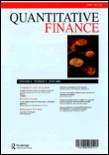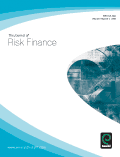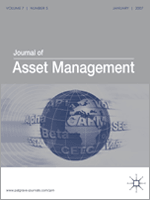
QUANTITATIVE FINANCE
Scope & Guideline
Bridging theory and practice in quantitative finance.
Introduction
Aims and Scopes
- Financial Modeling and Derivatives Pricing:
This area explores advanced mathematical models for pricing various financial derivatives, including options and bonds, often incorporating stochastic processes, volatility modeling, and numerical methods. - Risk Management and Quantitative Risk Measures:
Research in this scope focuses on developing and implementing quantitative measures of risk, including Value-at-Risk (VaR), Expected Shortfall, and other metrics, to assess and mitigate financial risks. - Portfolio Optimization and Asset Allocation:
This core area investigates methodologies for asset allocation and portfolio construction, integrating various risk-return frameworks, constraints, and optimization techniques to enhance investment performance. - Machine Learning and Data Science Applications:
The journal increasingly includes studies on applying machine learning techniques to financial data analysis, trading strategies, portfolio management, and predictive modeling, reflecting the growing importance of data-driven approaches in finance. - Market Microstructure and Trading Strategies:
Research in this area examines the dynamics of trading mechanisms, order flow, and liquidity, aiming to develop strategies that capitalize on market microstructure characteristics.
Trending and Emerging
- Integration of Machine Learning in Finance:
There is a significant uptick in research applying machine learning algorithms to various aspects of finance, including risk assessment, trading strategies, and portfolio management, highlighting the transformative impact of AI on quantitative finance. - Cryptocurrency and Digital Assets:
The increasing focus on cryptocurrencies and digital assets, including their pricing, risk management, and market dynamics, indicates a burgeoning interest in this area, driven by the rapid growth and volatility of digital currencies. - Dynamic Risk Management Techniques:
Emerging methodologies that incorporate dynamic and adaptive approaches to risk management are gaining traction, reflecting a shift towards more responsive and robust frameworks in the face of market uncertainties. - Sustainable Finance and ESG Considerations:
There is a growing emphasis on incorporating Environmental, Social, and Governance (ESG) factors into financial modeling and investment strategies, reflecting the increasing importance of sustainability in finance. - High-Frequency Trading and Market Microstructure:
Research focusing on high-frequency trading strategies and the implications of market microstructure is on the rise, driven by advancements in technology and data availability.
Declining or Waning
- Traditional Economic Models:
There has been a noticeable decline in papers focusing purely on classical economic theories without incorporating modern quantitative methods or computational techniques, indicating a shift towards more innovative and data-driven approaches. - Static Risk Measures:
Research centered around static risk measures, such as standard deviation and basic Value-at-Risk calculations, has become less frequent, as the field evolves towards dynamic and more comprehensive risk assessment frameworks. - Basic Statistical Methods:
Studies employing traditional statistical methods without incorporation of advanced techniques or machine learning have decreased, suggesting a movement towards more complex and computationally intensive methodologies.
Similar Journals

FINANCE AND STOCHASTICS
Pioneering Research in Financial StochasticsFinance and Stochastics is a leading academic journal published by Springer Heidelberg, focusing on the intricate interplay of finance, probability, and statistics. With an impressive impact factor and ranked within the Q1 category in both finance and statistics, it serves as an essential resource for researchers and professionals seeking to advance their understanding of stochastic modeling in financial contexts. The journal has maintained a strong reputation since its inception, with contributions from renowned scholars worldwide. The editorial team prioritizes high-quality research that addresses contemporary challenges in financial mathematics and extends the boundaries of statistical methods. Nestled in the heart of Germany, Finance and Stochastics embraces a broad scope, inviting submissions that explore innovative approaches to economic theory and quantitative methodologies. This combination of rigorous academic standards and commitment to impactful research makes the journal a pivotal avenue for disseminating knowledge and fostering collaboration in the finance and statistics communities.

Decisions in Economics and Finance
Transforming Ideas into Impactful Financial StrategiesDecisions in Economics and Finance, published by SPRINGER INT PUBL AG, is a leading journal in the fields of economics, econometrics, and finance, providing a critical platform for researchers, professionals, and students to disseminate their findings and insights. With an impressive impact factor positioned in the Q2 category for both Economics and Finance in 2023, this journal is recognized for its rigorous peer-reviewed process and impactful research contributions. The journal spans over areas of general economics and finance, emphasized by its Scopus rankings, which place it in the 68th and 50th percentiles respectively. Since its inception in 1997 and continuing through its conferred years, Decisions in Economics and Finance continues to foster innovative approaches to economic and financial decision-making while bridging theoretical and practical applications. While it currently does not offer Open Access options, its commitment to quality research and interdisciplinary collaboration makes it a vital resource for anyone engaged in these dynamic fields.

SIAM Journal on Financial Mathematics
Connecting Theory and Practice in Financial MathematicsThe SIAM Journal on Financial Mathematics, published by SIAM PUBLICATIONS, is a premier journal dedicated to the intersection of applied mathematics and finance. With an ISSN of 1945-497X, this journal serves as a vital platform for the dissemination of innovative research that addresses complex financial problems through mathematical modeling and analytical techniques. The journal has established itself within the Q2 quartile in the categories of Applied Mathematics, Finance, and Numerical Analysis, reflecting its influence and significance in these fields. Researchers and practitioners will find a wealth of knowledge spanning topics from stochastic calculus to quantitative finance, making it essential for anyone aiming to advance their understanding of financial mathematics. As the journal continues to converge from 2010 to 2024, it promises to remain a cornerstone resource for academics, professionals, and students alike, facilitating the ongoing dialogue between mathematics and its applications in the financial industry.

Mathematics and Financial Economics
Innovating Financial Strategies through Mathematical RigorMathematics and Financial Economics, published by Springer Heidelberg, is a leading peer-reviewed journal that explores the intersections of mathematical theories and financial practices. With an ISSN of 1862-9679 and an E-ISSN of 1862-9660, the journal has made notable contributions to its field since its inception in 2007, with a convergence period extending until 2024. Positioned in the prestigious Q2 category for both Finance and Statistics and Probability, the journal is ranked within the top 66th percentile in Mathematics and Statistics and the 62nd percentile in Decision Sciences according to Scopus metrics. Researchers and professionals looking for high-quality, innovative research in mathematical finance will find valuable insights within its pages. Although primarily a subscription-based journal, it aims to foster knowledge sharing among academia and industry experts. Its commitment to advancing quantitative methods and financial applications solidifies its importance as a resource for students, researchers, and practitioners dedicated to understanding and navigating the complex dynamics of financial markets.

Journal of Investment Management
Illuminating Contemporary Issues in Investment Management.The Journal of Investment Management, with ISSN 1545-9144 and E-ISSN 1545-9152, is a prominent platform dedicated to the dissemination of cutting-edge research in the field of investment management. Published by JOURNAL INVESTMENT MANAGEMENT, this journal aims to bridge the gap between theoretical foundations and practical applications, catering to the needs of researchers, professionals, and students alike. With a focus on contemporary issues influencing investment strategies, asset allocation, risk management, and financial innovation, this journal provides valuable insights and methodologies to enhance investment decision-making processes. While currently not operating under an open-access model, the journal is accessible through various academic databases, ensuring that its critical findings reach a wide audience across the globe. Emphasizing the significance of empirical research and analytical rigor, the Journal of Investment Management plays a crucial role in shaping the future of investment practices and academic discourse in this dynamic field.

Journal of Risk Finance
Empowering research for informed financial decisions.The Journal of Risk Finance, published by Emerald Group Publishing Ltd, is a premier academic journal dedicated to advancing the understanding of risk management and finance practices since its inception in 1999. With a strong foothold within the Q2 rankings in both Accounting and Finance categories, it proudly holds a significant place in the scholarly landscape, ranking #54 out of 317 in the Scopus Economics and Finance category, placing it in the 83rd percentile. The journal aims to facilitate the exchange of innovative research and practical insights, catering to an audience of researchers, professionals, and students eager to explore contemporary issues in risk finance. While not an open access journal, it provides numerous access options, ensuring that essential findings reach a broad readership. Set in the United Kingdom and covering publications up to 2024, the Journal of Risk Finance continues to be an indispensable resource for those committed to this critical field.

Annals of Finance
Pioneering Insights in Economics and FinanceThe Annals of Finance, published by Springer Heidelberg in Germany, stands as a pivotal journal within the realms of Economics, Econometrics, and Finance. With a dedicated convergence of research from 2005 to 2024, this esteemed publication features thought-provoking articles that address both theoretical and practical aspects of finance, earning it a commendable Q2 category ranking in the 2023 metrics for both Economics, Econometrics and Finance as well as Finance. The journal serves an essential role in disseminating knowledge and fostering advancements in the field, appealing to researchers, professionals, and students alike. Its rigorous peer-review process ensures the integrity and quality of published works, making it a reliable source for cutting-edge findings and discussions within the finance community. For those looking to navigate the complexities of modern finance through rigorous research, the Annals of Finance is an invaluable resource.

Review of Derivatives Research
Advancing Knowledge in Finance and EconomicsThe Review of Derivatives Research, published by SPRINGER, stands as a pivotal platform for the dissemination of innovative research in the fields of derivatives, finance, and economics. Established in 1996, this journal provides deep insights into the theoretical and practical aspects of derivatives markets, catering to a diverse audience comprising researchers, practitioners, and academics. With an impact factor that reflects its significance in the scholarly community, it currently holds a Q2 ranking in the Economics, Econometrics and Finance (miscellaneous) category and a Q3 ranking in Finance, demonstrating its relevance and influence within these fields. Although it does not offer an open-access model, the Review of Derivatives Research remains an essential resource for those seeking to advance their understanding of complex financial instruments and market dynamics from 2002 to 2024. The journal's dedicated focus on the intricacies of derivatives paves the way for significant contributions to both academic research and practical applications in finance.

Journal of Asset Management
Connecting Theory and Practice in Asset ManagementThe Journal of Asset Management, published by Palgrave Macmillan Ltd, is a premier academic journal dedicated to advancing the fields of asset management, business strategy, and international management. With an ISSN of 1470-8272 and an E-ISSN of 1479-179X, this journal has established its reputation as a vital resource for researchers, professionals, and students alike. Operating from the United Kingdom, it spans a convergence of scholarly contributions from 2009 to 2024, positioning itself prominently in the academic landscape. In 2023, it achieved a remarkable Q2 ranking in three key categories: Business and International Management, Information Systems and Management, and Strategy and Management. The journal's Scopus ranks further reflect its impact, featuring positions within the top percentile for relevant academic disciplines, emphasizing its importance and influence. While it currently offers traditional subscription-based access, the journal remains committed to disseminating vital research that shapes best practices in asset management. Researchers are encouraged to engage with the cutting-edge findings published herein, making it an essential tool for anyone looking to deepen their understanding of asset management dynamics and strategic decision-making.

Algorithmic Finance
Fostering Interdisciplinary Dialogue in Financial AlgorithmsAlgorithmic Finance, published by IOS PRESS, is a pivotal journal devoted to the burgeoning field of finance through the lens of computational methodologies. With its ISSN 2158-5571 and E-ISSN 2157-6203, the journal has been a platform for scholarly articles exploring the intricate interactions between algorithms and financial systems since its establishment in 2011. Although it currently resides in the Q4 quartile across several categories, including Computational Mathematics and Finance, it serves as a critical resource for researchers seeking to innovate within the financial landscape using algorithmic techniques. The journal is particularly relevant for an audience of academics, finance professionals, and graduate students, providing insights that combine quantitative analysis with economic theory. Located in Amsterdam, Netherlands, Algorithmic Finance aims to foster an interdisciplinary dialogue, making significant strides in the analytical approaches to financial markets while adhering to rigorous scientific standards. With its growing archive of research, the journal aspires to enhance the understanding of algorithmic strategies in finance, thereby encouraging further inquiry and application in real-world scenarios.